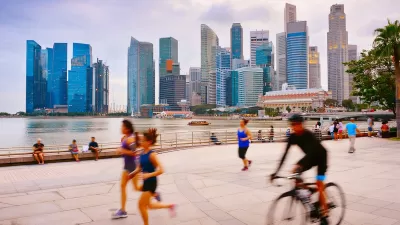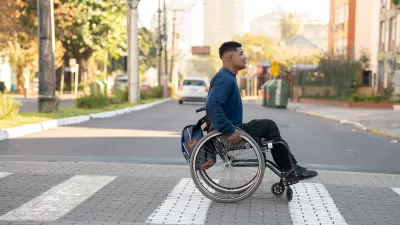A week ago I spent some time with Enrique Peñalosa, urban strategist and provocateur. North Americans don’t often look south for innovation, but Peñalosa made remarkable changes in the public environment as Mayor of the city of Bogotá, Colombia. Nearly impeached for his actions to push cars aside in favor of people, now he is invited to provoke and inspire others. “We have Environmental Impact Statements; why don’t we have Human Impact statements,” is a sampling from last week.
A week ago I spent some time with Enrique Peñalosa, urban strategist and provocateur. North Americans don't often look south for innovation, but Peñalosa made remarkable changes in the public environment as Mayor of the city of Bogotá, Colombia. Nearly impeached for his actions to push cars aside in favor of people, now he is invited to provoke and inspire others. "We have Environmental Impact Statements; why don't we have Human Impact statements," is a sampling from last week.
Enrique Peñalosa was in Boston at the invitation of the Livable Streets Alliance. My organization, the Institute for Human Centered Design (formerly Adaptive Environments), and four other advocacy organizations co-hosted. The Institute for Transportation and Development Policy (ITDP) made it possible. What all these organizations have in common with Peñalosa is a vision for a different kind of city, one that privileges human comfort and social interaction. Hence the potentially provocative jab at the EIS. The EIS process has prevented or mitigated the effect of some potentially harmful projects, but perhaps we hide behind the spotted toad and the striped bass when we need to stand up for people more forcefully. We may not be able to measure the value of beauty and usability (Planetizen '07) but we need them everywhere. Peñalosa calls it Urban Happiness.
While the U.S. tends to look to Germany, Sweden, Denmark, the Netherlands, France, even Italy, for examples of urban space wrestled back from cars. Our southern neighbors have equally distinguished examples. In a recent trip from Buenos Aires, Argentina to Santiago, Chile I traveled through Montevideo and Colonia, Uruguay; Rosario, Mendoza, San Juan and Cordoba, Argentina; Viña del Mar and Valparaiso, Chile. All ten cities had significant thriving downtown pedestrian zones. The smallest was perhaps 5 blocks in San Juan, the largest 30 blocks in Santiago.


These images (San Juan, Argentina and Santiago, Chile) seem impossible to imagine throughout the U.S.
Our pedestrian zones are timid attempts in comparison. New York closes a few blocks along Nassau Street in the financial district in midday. Madison, Wisconsin closes six blocks, Charlottesville, VA about the same; Portland, OR two blocks; Memphis TN ¾ of a mile, Boston 4 blocks: not bad, but not much.
Temporal street closings in parks such as Central Park in New York, Golden Gate Park in San Francisco and Rock Creek Park in Washington, D.C. are spreading, but non-park street closings are still a radical idea. Notable exceptions include the 1.6 miles of Memorial Drive in Cambridge, MA which has been closed on Sundays for more than 30 years. But facing it across the river, Boston holds on stubbornly to Storrow Drive, only allowing a car free 30 minutes a year for the city-wide bike tour. El Paso, Texas on the other hand, looked across the Rio Grande and saw the success of car free Sundays in Ciudad Juarez, Mexico and jumped at the cheapest way possible to increase public open space. New York managed to close Park Avenue (except for cross traffic) from 72nd St to the Brooklyn Bridge for 3 weekends last summer. Chicago, Portland, Miami and Las Cruces are inching towards regular summer closings. But our neighbors have been at this for decades. Not only Juarez, but Quito, Ecuador, Curitiba and Rio de Janeiro, Brazil; Mexico City, Mexico and the grandaddy of them all, Peñalosa's Bogatá, Colombia which started in the 1980's and now closes more then 70 miles of city streets for the 2 million people who come out every Sunday.


Car-free Sunday in Rio de Janeiro, Brazil and Bogotá, Colombia
There are endless arguments against taking public space away from private vehicles for car-free days. But no one says that ordinary citizens won't like it and won't use and won't celebrate it. Every living example proves that they will. If we start from that human-centered perspective, then I have no doubt we can figure out the details. Peñalosa points out that solutions in Bogotá were driven by limited time, limited funds and limited happiness. Sounds familiar. Look to South America. Urban Happiness is in the works there.

Planetizen Federal Action Tracker
A weekly monitor of how Trump’s orders and actions are impacting planners and planning in America.

Maui's Vacation Rental Debate Turns Ugly
Verbal attacks, misinformation campaigns and fistfights plague a high-stakes debate to convert thousands of vacation rentals into long-term housing.

San Francisco Suspends Traffic Calming Amidst Record Deaths
Citing “a challenging fiscal landscape,” the city will cease the program on the heels of 42 traffic deaths, including 24 pedestrians.

Defunct Pittsburgh Power Plant to Become Residential Tower
A decommissioned steam heat plant will be redeveloped into almost 100 affordable housing units.

Trump Prompts Restructuring of Transportation Research Board in “Unprecedented Overreach”
The TRB has eliminated more than half of its committees including those focused on climate, equity, and cities.

Amtrak Rolls Out New Orleans to Alabama “Mardi Gras” Train
The new service will operate morning and evening departures between Mobile and New Orleans.
Urban Design for Planners 1: Software Tools
This six-course series explores essential urban design concepts using open source software and equips planners with the tools they need to participate fully in the urban design process.
Planning for Universal Design
Learn the tools for implementing Universal Design in planning regulations.
Heyer Gruel & Associates PA
JM Goldson LLC
Custer County Colorado
City of Camden Redevelopment Agency
City of Astoria
Transportation Research & Education Center (TREC) at Portland State University
Jefferson Parish Government
Camden Redevelopment Agency
City of Claremont






























